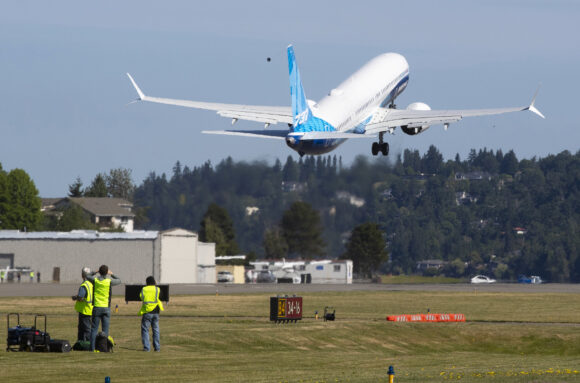Boeing Co. has tentatively settled with the U.S. Department of Justice in a deal that would allow the aerospace giant to avoid criminal prosecution connected to two deadly crashes involving its 737 Max aircraft over six years ago.
This provisional agreement, disclosed in a federal court filing on Friday, comes just weeks before a criminal trial was scheduled to begin on June 23 in Fort Worth, Texas. The deal includes a payment of over $1.1 billion by Boeing and requires the company to improve its safety and quality control systems, according to DOJ attorneys.
The development marks a dramatic shift in the high-profile legal saga. As recently as last year, Boeing had consented to plead guilty to a criminal conspiracy charge. However, that plea agreement was rejected in December by U.S. District Judge Reed O’Connor, who has overseen the proceedings since 2021.
This newly proposed resolution — which faces objections from numerous crash victims’ families — still needs the judge’s approval. While a complete version of the agreement is expected to be submitted by the end of next week, the DOJ outlined key aspects in Friday’s filing. Among the conditions: a $243.6 million fine and a mandate for Boeing’s board of directors to meet with the families of those who died in the crashes.
Under the terms, Boeing would allocate $444.5 million to a compensation fund for families of victims from the Lion Air Flight 610 crash in October 2018 and the Ethiopian Airlines Flight 302 disaster in March 2019. Additionally, the company would dedicate $455 million toward enhancing its internal compliance, quality, and safety standards.
“This outcome represents the fairest resolution based on the facts, legal standards, and department policy,” federal prosecutors stated. They added that they had engaged in extensive consultations with victims’ families throughout the process.
Pushback From Families
Despite the DOJ’s filing, attorneys for victims’ families told Judge O’Connor they plan to contest the agreement and will ask the court not to dismiss the criminal charges against Boeing.
“The families intend to argue that this dismissal grants Boeing privileges that are not typically extended to other criminal defendants and fails to ensure justice for the 346 lives lost,” the lawyers stated in their response.
Many of the families have long opposed any resolution that would spare Boeing from criminal accountability. For years, they’ve called for tougher consequences for the company. Both aviation tragedies were attributed to defects in the 737 Max’s flight control software. To date, the only Boeing employee tried in connection with the incidents was a mid-level manager involved with pilot documentation and training—who was acquitted.
Catherine Berthet, whose 28-year-old daughter Camille Geoffrey died in the Ethiopian crash, called the proposed deal “absolutely shocking.”
“I will never escape my grief,” she said. “By choosing not to prosecute Boeing, the government is essentially saying that large corporations are above the law—even when their actions result in death.”
However, not every family opposes the agreement, prosecutors noted.
According to Friday’s court documents, over 100 crash victims’ families or their legal representatives have either backed the deal, asked that the case be resolved outside of trial, or expressed no objection. One family member reportedly told prosecutors they hoped the DOJ would resolve the case “as soon as possible.”
Boeing declined to issue a statement regarding the settlement. Its stock dropped slightly—less than 1%—on Friday.
A Twisting Legal Path
The case has taken several turns over the past few years. In 2021, Boeing reached a deferred prosecution agreement with the DOJ, admitting it had misled regulators about the flight control system. That initial deal involved the same $243.6 million fine.
But in early 2024—just days before that charge was set to be dropped—a separate safety issue emerged when a door plug blew off a 737 Max during flight. Though no injuries occurred, it reignited scrutiny of Boeing’s manufacturing practices.
The DOJ concluded that Boeing had failed to comply with the 2021 agreement and recommended pressing criminal charges. Boeing then agreed to plead guilty, pay another fine, and accept an independent compliance monitor. It also committed to spending $455 million to overhaul its safety systems.
That revised plea, however, was rejected by Judge O’Connor in December. He argued that the deal undercut his judicial authority and criticized the proposed monitor selection process, which included diversity, equity, and inclusion (DEI) considerations—something he said would improperly factor race into hiring.
In March, O’Connor ordered the case to proceed to trial in June. While he didn’t provide a full explanation, his decision came just one day after The Wall Street Journal reported Boeing was attempting to negotiate leniency with prosecutors to avoid further criminal exposure.
The original deferred prosecution deal had been arranged under the Biden administration, which maintained that the DEI language followed standard protocol. Since taking office on January 20, President Donald Trump has been rolling back diversity initiatives across federal agencies.
The case is titled United States v. Boeing, case number 21-cr-005, in the U.S. District Court for the Northern District of Texas (Fort Worth Division).


This deal is a critical step for Boeing to move forward and rebuild trust with the public.
Hope this settlement brings closure and helps improve aviation safety standards.
Important progress, but accountability and transparency must continue throughout this process.